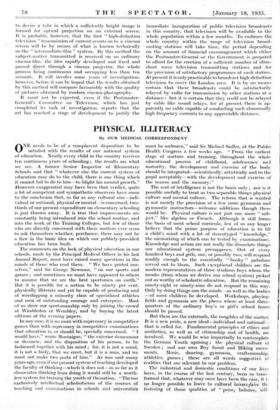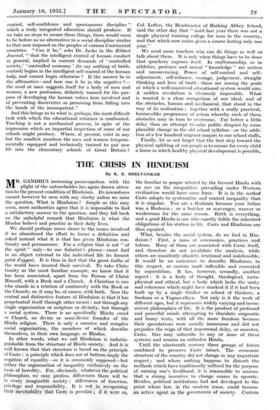PHYSICAL ILLITERACY
By OUR MEDICAL CORRESPONDENT
nNE needs to be of a complacent disposition to be kJ satisfied with the results of our national system of education. Nearly every child in the country receives ten continuous years of schooling ; the results are what we see. A former Senior Inspector of Elementary Schools said that " whatever else the current system of education may do to the child, there is one thing which it cannot fail to do to him—to blight his mental growth." However, exaggerated may have been that verdict, quite a lot of competent and sympathetic observers have come to the conclusion that, so far as any cultural aim—indi- vidual or national, physical or mental—is concerned, two- thirds of our present expenditure on elementary schooling is just thrown away. It is true that improvements are constantly being introduced into the school routine, and into the work of the Training Colleges, but few of those who are directly concerned with these matters ever seem to ask themselves whether, perchance, there may not be a flaw in the basic idea on which our publicly-provided education has been built.
The comments on the lack ,of physical education in our schools, made by the Principal Medical Officer in his last Annual Report, must have raised many questions in the minds of those who read them. " We have prided our- selves," said Sir George Newman, " on our sports and games ; and sometimes we must have appeared to others to assume that we are the best sportsmen on earth." But it is possible for a nation • to be ninety per cent. -physically illiterate and yet be capable of producing and of worshipping a minority class of specialized athletes :and men of outstanding courage and enterprise. Most of us show our sportsmanship only by joining the crowd at Wimbledon or Wembley, and by buying the latest 'editions of the evening papers. , . In any case, it is no more with supremacy in competitive games than with supremacy in competitive examinations that education is, or should. be, specially concerned. " I would have," wrote Montaigne, " the exterior demeanour or decencie, and the disposition of his person, to be fashioned together with his mind ; for, it is not a mind, it is not a body, that we erect, but it is a man, and we must not make two parts of him:" As was said many . years ago, even if our present system of teaching developed the faculty of thinking—which it does not—in so far as it dissociates thinking from doing it,would still,be a worth- - less system for training the youth of, thenation, "The too .exclusively intellectual scholasticism of the courses Of teaching and examinations in schools Find universities must be unfrozen," said Sir Michael -Sadler, at. the Public Health Congress a few weeks ago. " From the earliest stage of nurture and training, throughout the whole educational process of childhood, adolescence and maturity, the development and exercise of the body should be integrated—scientifically, artistically and to the pupil acceptably—with the development and exercise of the reason and the memory."
The seat of intelligence is not the brain only ; nor is it possible usefully to treat as two separable things physical culture and mental culture. The reform -that is wanted is not merely the provision of a few more gymnasia and gymnastic instructors—welcome additions though these would be. Physical. culture is not just one more " sub- ject," like algebra or French. Although it still forms the basis of most school curricula, few of us any longer believe that the prime purpose of education is to fill a child's mind with a lot of stereotyped " knowledge," the memorizing of which can be tested by examinations. Knowledge and action are not really the dissociate things our educational system presupposes.. Out of every hundred boys and girls, one, or possibly two, will respond readily enough to the essentially " hooky " pabulum served out to them. Such exceptional children arc the modern representatives of those studious boys whom the -monks (from whom we derive our school system) picked out as worthy of scholastic education. But the remaining ninety-eight or ninety-nine do not respond in this way. Only by doing things can the minds—as well as the bodies -of most children be developed. Workshops, playing- fields and gymnasia are the places where at least three- quarters of the ordinary - boy's or girl's school hours Should be passed: But these are the externals, the tangibles of the, Matter'. It is a new pride, a new ideal—individual and national:L. that is called for. Fundamental principles of ethic's' and aesthetics, as well as of citizenship and of health, arc involved. We would be wise impartially to contemplate the German Youth uprising ; the physical ctilttire of Sweden ; and our own Boy Scout, and Hiking move- ments. Music, dancing, gymnasia, craftsmanship, athletics, games ; these , are . all words suggestive of realities that are relevant to our problem': The industrial and domestic conditiOns of our liVes have, in the course of the last century,. been so tran,,- formed that, whatever may once have been the cake, it i- up longer possible to leave to cultural kriarz-faire tb fostering of thoie •ilualitieS of "-poise; balance, -self- control, self-confidence and spontaneous discipline " which a truly integrated education should produce. If we take no steps to secure these things, there would seem to be before us no alternative to a social discipline similar to that now imposed on the peoples of various Continental countries. " Can it be," asks Dr. Jacks in the Hibbert Journal, " that the intelligent control of human conduct in general, implied in current demands of ' controlled society,' controlled economy' (to say nothing of birth- control) begins in the intelligent self-control of the human body, and cannot begin otherwise ? If the answer be in the affirmative—and how can it be in the negative ?- the need at once suggests itself for a body of men and women, a new profession, definitely trained for the pur- pose of developing the human values here involved and of preventing discoveries so promising from falling into the hands of the incompetent."
And this brings us to what is, perhaps, the most difficult task with which the educational reformer is confronted. Teaching is not a mechanical process, in spite of the impression which an impartial inspection. of some of our schools might produce. Where, at present, exist in any but the smallest numbers the men and women tempera- mentally equipped and technically trained to put new life into the elementary schools of Great Britain ? Col. Loftus, the Headmaster of Barking Abbey School, said the other day that "until last year there was not a single physical training college for men in the country, and that which now exists gives a course lasting only one year."
We need more teachers who can do things as well as talk about them. It is only when things have to be done that quackery exposes itself. In craftsmanship, as in athletics, pretence and unreal " knowledge " are useless and unconvincing. Power of self-control and self- adjustment, self-reliance, courage, judgement, straight thinking and love of truth—these are among the goals at which a well-conceived educational system would aim. A sudden revolution is obviously impossible. What is wanted is a clear recognition of our ideal, and of the obstacles, human and mechanical, that stand in the way of its realization ; together with a really practical, businesslike programme of action whereby each of these obstacles may in turn be overcome. Far better a little delay than an attempt to calm public disquiet by some plausible change in the old school syllabus—or the addi- tion of a few hundred sergeant-majors to our school staffs.
Finally, let us not forget that the first step toward the physical uplifting of our people is to ensure for every child a home in which healthy physical development is possible,







































 Previous page
Previous page